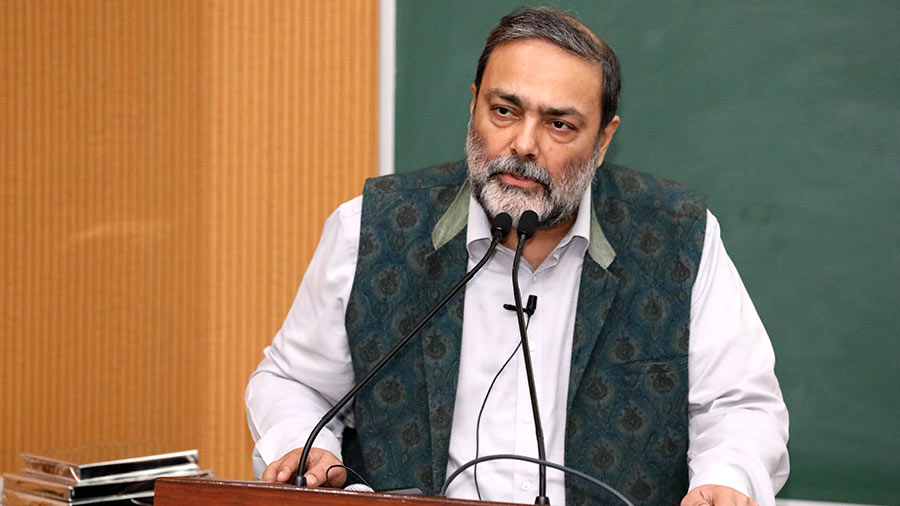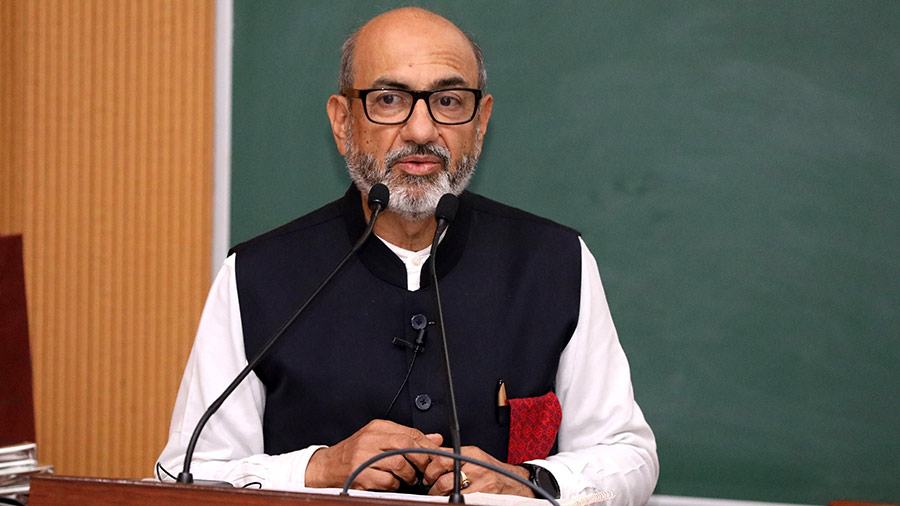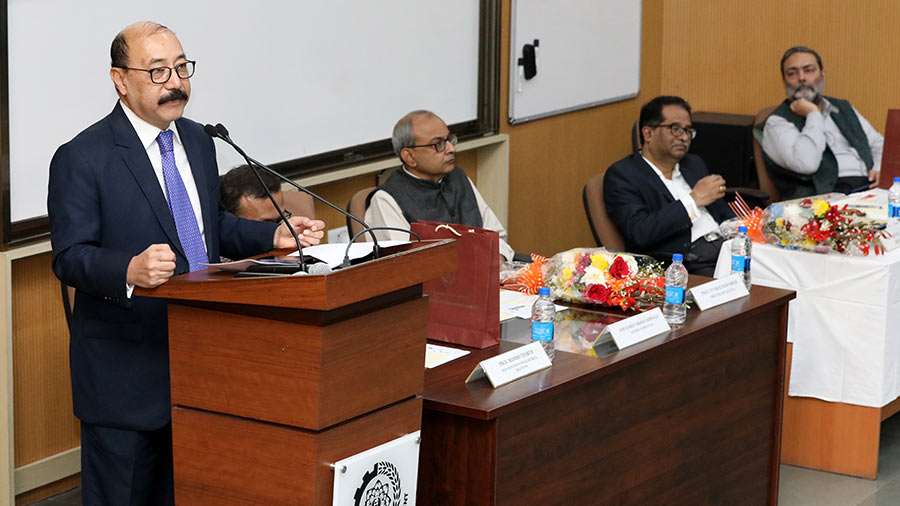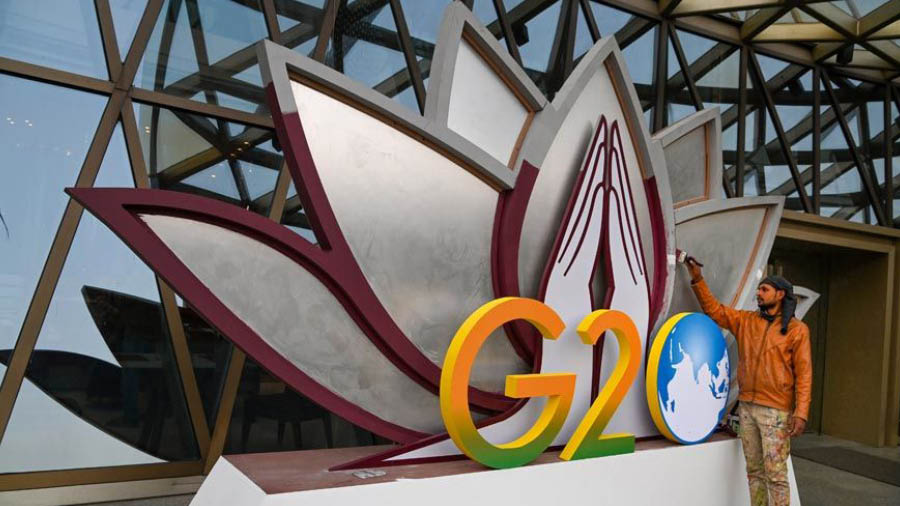Indian Institute of Management (IIM) Calcutta conducted the first lecture of the G20 University Connect Engaging Young Minds series on January 30. The event was organised in association with Research and Information System (RIS) for Developing Countries. The lecture was delivered by Harsh Vardhan Shringla, chief coordinator of G20.
Appreciating the initiative, Manish K Thakur, dean (New Initiatives & External Relations) said, “Today’s lecture is important for us all to understand what G20 is and how it will help India on a global level. IIM Calcutta is proud to be associated with this historic event and looks forward to its success.”
The Group of Twenty (G20) is a forum for international economic cooperation that plays an important role in shaping and strengthening global architecture and governance on all major international economic issues. Shringla, who explained the nitty-gritty of India’s G20 presidency and its significance in his lecture, said, “India has come a long way from depending on global assistance. Last December, India got the presidency of G20 which is one of the most influential groupings in the world. It has a great impact on the world economic scenario. G20 is the largest and most significant event India is hosting, so it is a great opportunity but also a challenge.”
Elaborating on the role of G20, Shringla said, “COVID-19 was a shock to the global economic system, a big one since World War II. Then we saw the Ukraine conflict that impacted countries all over the world. Developing countries are bearing the brunt of this with fallen GDP, higher inflation etc. There are higher expectations from the G20 as the United Nations have failed to provide solutions to many significant problems that the world faces today. So India’s presidency is also expected to be a pathway to solutions to many of the challenges faced globally.”
A panel discussion was also held with Varun Sahni, professor, Jawaharlal Nehru National University, Delhi, and Sanjay Chaturvedi, professor, South Asian University, Delhi. Biju Paul Abraham, professor, IIM Calcutta, was the moderator of the discussion.

Varun Sahni, professor, Jawaharlal Nehru National University, Delhi, was one of the panelists in the discussion
Varun Sahni in his address said, “G20 intends to solve a lot of common problems since its genesis. First, the new problems which involve climate change. Second, the old problems that revolve around world trade, urbanisation and energy resource scarcity. New approaches are needed to find solutions as the old approaches no longer work. G20 is expected to find modern-day solutions to both old and new problems.”
As one of the premier management institutes in India, IIM Calcutta has been roped in towards meeting the agenda in collaboration with the Research and Information System for Developing Countries and the Ministry of External Affairs. “India’s presidency of G20 needs to be seen in a larger context. The theme for the summit, ‘One Earth, One Family, One Future’ is going to focus on the global Anthropocene. The term Vasudhaiva Kutumbakam does not apply to only human beings but also to all living species that humanity shares the Earth with. So a lot of focus will be given to issues that impact the Earth in the G20 summit,” Chaturvedi said.

Sanjay Chaturvedi, professor, South Asian University, New Delhi, emphasised the need to see India’s G20 presidency in “a larger context” that benefits every living species on Earth
India’s G20 presidency began from December 1, 2022, and will continue till November 30, 2023. Through the University Connect programme, students from universities across India are engaged in order to create awareness about the G20 summit, India’s presidency and how India can emerge as a role model for the world. Holding the meeting at 56 different locations in India will ensure that the event appeals to all pan-India.
G20 University Connect was recently inaugurated by the External Affairs minister, S Jaishankar, during a curtain raiser event at the Sushma Swaraj Bhawan on December 1, 2022. Vice-chancellors from 75 universities joined in virtually and in person to bring the lessons back to their respective institutions.
The University Connect series will be executed in the form of lectures, mock G20 summits and other interactive activities enabling students to engage and involve in the G20 process on the sidelines. The project is leveraging the capabilities of the partner institutions with research support from RIS which is offering its prodigious intellectual resources and network of experts including former diplomats, academicians, and subject experts to maintain the academic nature of the deliberations.
G20 is a unique grouping accounting for 85 per cent of the global GDP, 75 per cent of global trade, and 65 per cent of the world’s population. As one of the leading nations of the Global South, India with its indispensable role in multilateral forums like the G20 is championing the cause of being the articulate voice of unheard nations.


